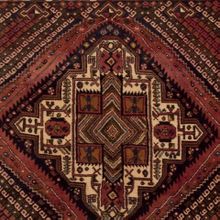Difference between revisions of "Shahr-e-babak Rug"
Jump to navigation
Jump to search
| Line 30: | Line 30: | ||
|Foundation material = [[Cotton]] | |Foundation material = [[Cotton]] | ||
|Weaving Technique = | |Weaving Technique = | ||
| − | |Knot type = [[Asymmetrical Knot|Asymmetrical]] | + | |Knot type = [[Asymmetrical Knot|Asymmetrical]] (Persian) |
|Knot density = | |Knot density = | ||
Revision as of 09:02, 14 September 2019
| Shahr-e-babak Rug | |
|---|---|
 Design of Shahr-e-babak Rug (Rugman) | |
| General information | |
| Name | Shahr-e-babak Rug |
| Original name | قالی شهربابک |
| Alternative name(s) | Shahr-e-babak Carpet |
| Origin | |
| Category | Village |
| Technical information | |
| Common designs | Medallion, Geometric, Vase |
| Common colors | Red, Brown, White, Golden, Blue |
| Dyeing method | Natural, Synthetic |
| Pile material | Wool |
| Foundation material | Cotton |
| Knot type | Asymmetrical (Persian) |
From the city of that name in southern Persia, the incredible Kerman carpet is a soft treasure, and among the most beautiful designs woven. The traditional motif has the main border and central medallion in an intricately-detailed, ornate architectural or floral theme in the palest pastels with white-and-gold trim. This typically contrasts with an open field of a rich solid cranberry red, navy blue or other strong colors. Others patterns include the finer Lavar style with garden, tree-of-life, vase and all-over mille fleur designs, or the many pictorials which tell the story of a significant figure or event in history. Silk is almost never used.[citation needed]